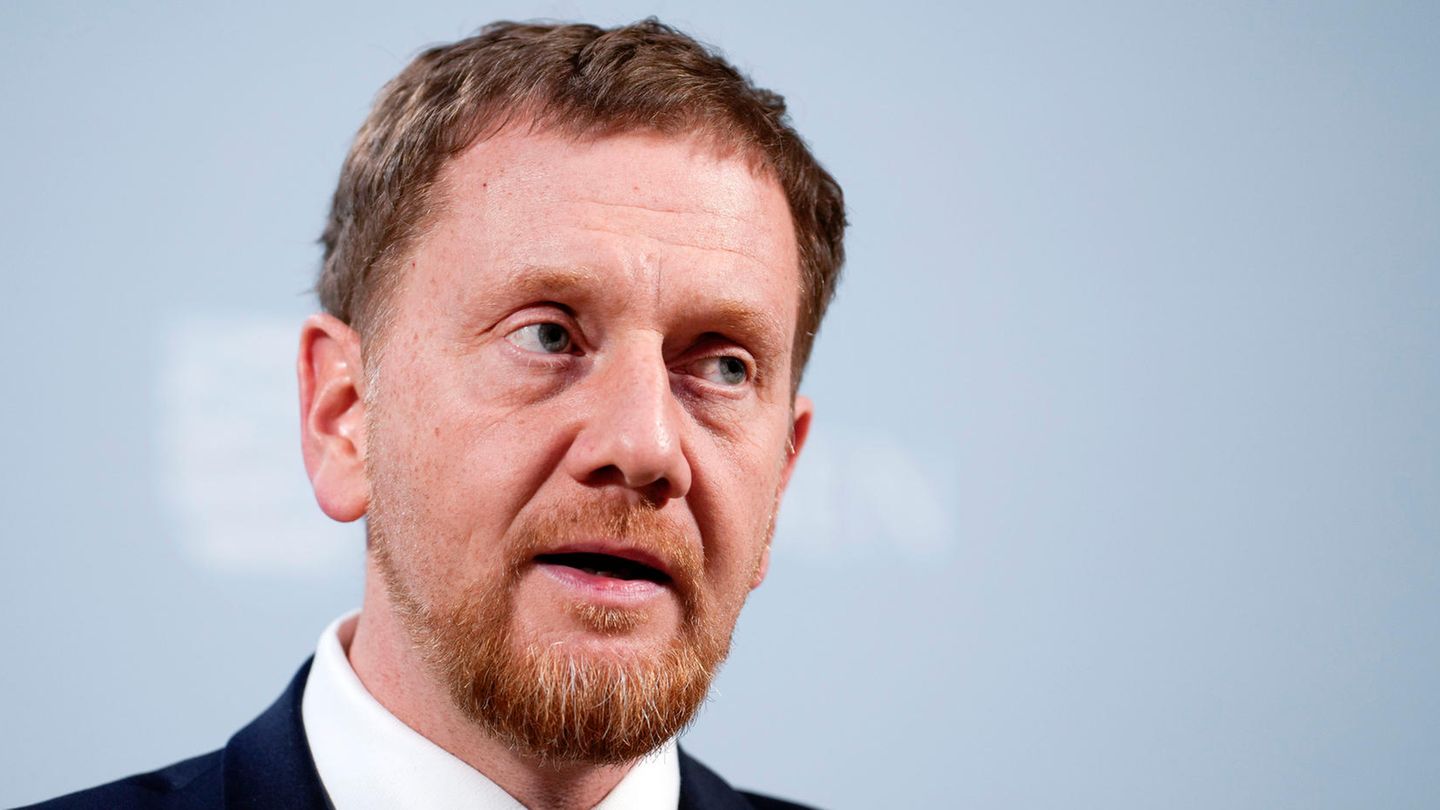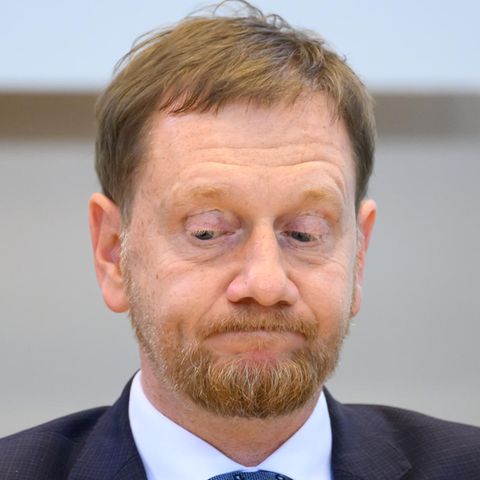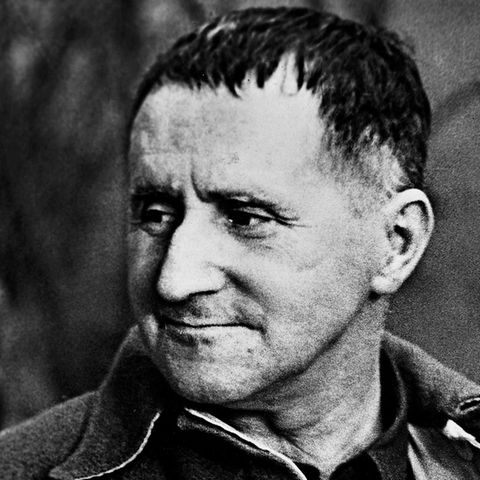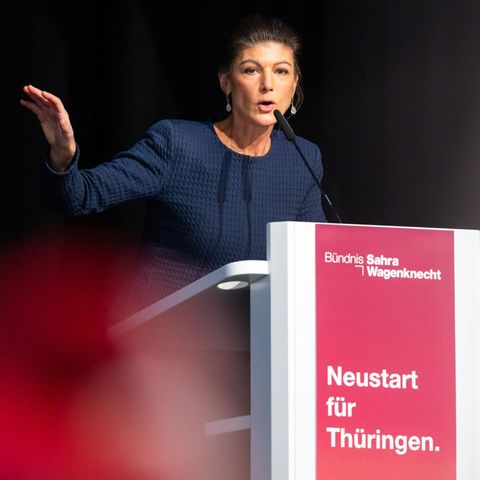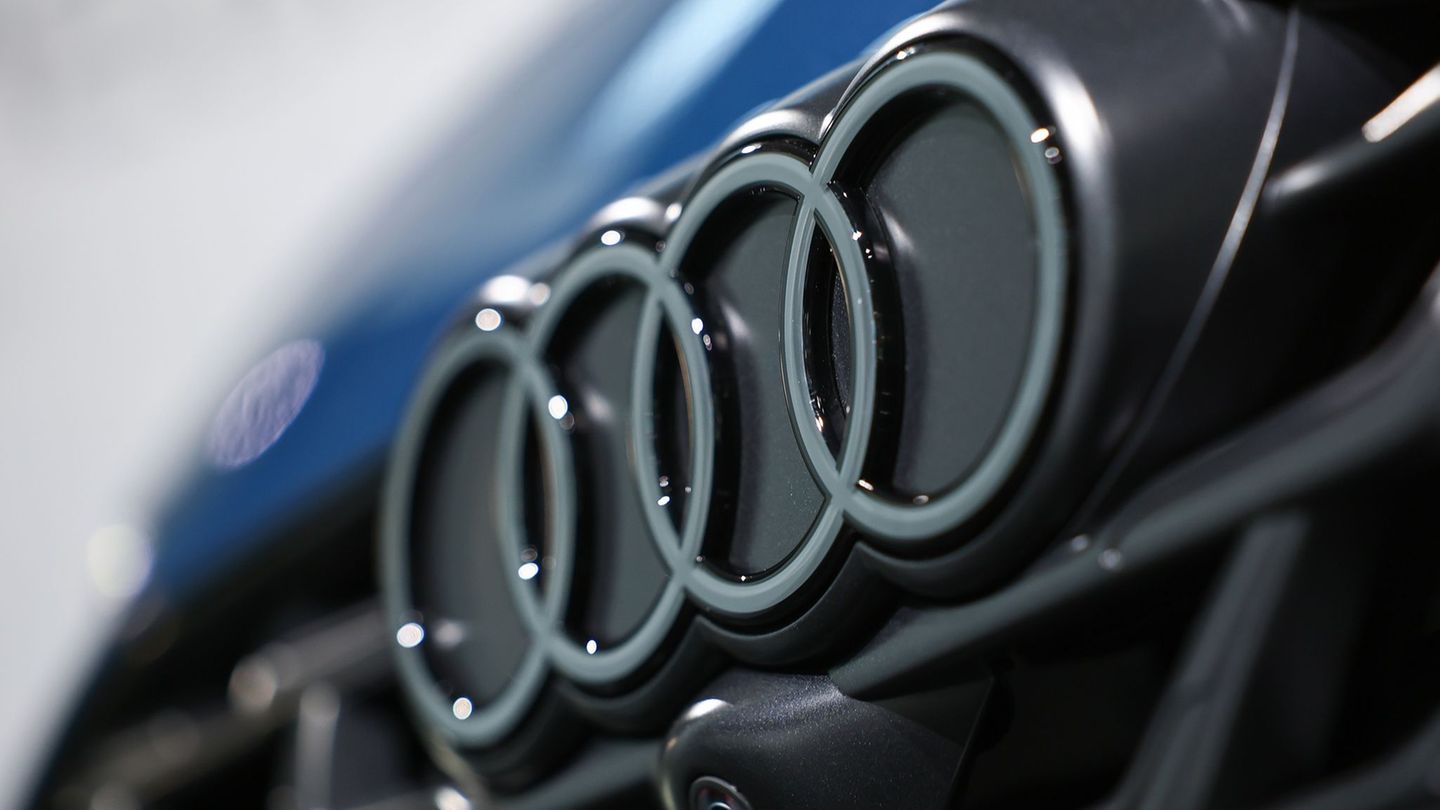Prime Minister election
Kretschmer or chaos – what is now at stake in Saxony
Copy the current link
The Saxon CDU Prime Minister Michael Kretschmer is running for re-election this Wednesday without a majority. This can go extremely wrong.
Tuesday, 1 p.m. sharp. The acting CDU Prime Minister of the Free State of Saxony hurries visibly disgruntled through a hallway on the fourth floor of the state parliament building. But when Michael Kretschmer reaches room A400, he puts on a broad smile.
At this point there are less than 24 hours until he wants to be elected head of government again. Without a majority. If this doesn’t work, there is a risk of chaotic conditions. Or the new parliamentary elections.
The head of government climbs the small staircase and enters the hall, which is easy to see because of the large glass panes. He theatrically spreads his arms and shouts humorously: “So this is the BSW faction!”
The curtains are then quickly closed. At least the rest of the sad spectacle should remain internal.
Kretschmer has had to endure a lot since the state elections on September 1st. But this appointment represents a very special humiliation.
The possible drama of Michael Kretschmer
Of all people, he has to ask for votes from the Sahra Wagenknecht Alliance, the state party that previously rudely rejected him. And he has to listen to their conditions again as kindly as possible: more money for the municipalities, no cuts in social and cultural services and, very importantly, a Federal Council initiative against arms deliveries to Ukraine.
The Prime Minister knows the demands. The BSW had already started exploratory talks with the CDU and SPD about a majority coalition – only to surprisingly withdraw at the beginning of November. Above all, it was about the “peace formula” that Wagenknecht ultimately demanded.
With the exit of the BSW, the only realistic majority option for Kretschmer was gone. That’s why he now wants to form a minority government with the SPD. And although he has no binding commitments from the other parties, he is standing for election as Prime Minister in the Dresden state parliament this Wednesday.
The secret vote is scheduled to begin at 10 a.m. And it could end up as a major political drama that is difficult to understand in its complexity. Therefore an explanation will be attempted here.
A parliament without majorities
In the state elections, the previous Kenya coalition made up of the CDU, SPD and Greens lost their majority. However, the Union once again became the strongest party and now has 41 MPs. The second largest faction is the AfD with 40 mandates. The BSW (15 seats), the SPD (10 seats), the Greens (7 seats), the Left (6 seats) and the Free Voters MP Matthias Berger follow at some distance.
The CDU, together with the SPD, only got 51 votes. And with a total of 120 representatives, the absolute majority is 61 votes. So ten are missing.
The election procedure
But this absolute majority is only necessary in the first round of voting. From the second round of voting onwards, “the majority of the votes cast”, i.e. the simple majority, is sufficient.
However, there is debate about how to vote. From the point of view of State Parliament President Alexander Dierks (CDU), no votes are possible for several candidates. His argument, which he had confirmed with the help of a legal opinion: According to the experiences of the Weimar Republic, the aim of the state constitution was to counteract “a pure blockade by negative majorities”.
The Greens contradict this with a different legal opinion. And they are considering requesting the no option before the vote. Kretschmer would then not be elected even with a simple majority if the result were opposed to a majority of no votes
What makes the procedure particularly unpredictable: New candidates can register until shortly before the first round of voting. And they can even spontaneously run in the second or subsequent round of voting.
The candidates
So far three applicants have announced themselves. Kretschmer is running at the suggestion of the CDU and SPD. The 49-year-old is the state leader and federal deputy of his party and has been Prime Minister since 2017. He wants to give his minority government a majority in the state parliament through a so-called consultation process.
The AfD has announced Jörg Urban as a candidate: The 60-year-old has been sitting for the AfD in the state parliament since 2014, he has been state party leader since 2018, and he also heads the parliamentary group in the state parliament. Urban is considered to be part of the right-wing extremist camp. If elected, he would have no partner. The BSW also refuses to cooperate.
In addition, Matthias Berger, 56, is applying to be the new Prime Minister. The officially non-party MP was mayor of Grimma for decades. In September he ran as the Free Voters’ top candidate and won his home constituency outright. If successful, Berger wants to form a so-called expert government to which all factions, including the AfD, would be allowed to send ministers.
Scenario I: Kretschmer elected with the help of the AfD
In the first round of voting, Kretschmer apparently cannot even count on all the votes from the CDU. At least five MPs are considered potential defectors. He can also expect little support from the BSW and the Greens. So far there have only been positive signals from the left.
That means: He is far from the necessary 61 votes – unless Urban doesn’t run and the AfD does what it supposedly doesn’t want to do: it votes for Kretschmer.
Then there would probably be a head of government with the help of right-wing extremists. If Kretschmer took office, the situation would be similar to that after the election of Thuringia’s FDP Prime Minister Thomas Kemmerich in winter 2020. The SPD would be under great pressure to leave the coalition – which would mean a CDU minority government with the support of the AfD.
Theoretically, it is also possible that Berger will be elected with the votes of the AfD, BSW and some CDU renegades. But almost no one in Dresden expects that.
Scenario II: Kretschmer wins thanks to a relative majority – right?
It is more likely that the decision will only be made in the second round of voting. Because Kretschmer then just has to get more votes than his opposing candidates.
But the more important thing here is that if the AfD, BSW and some CDU MPs voted for ex-Mayor Berger while the Greens and the Left abstained, he could definitely beat Kretschmer.
Then there was political chaos in Saxony. And that wouldn’t even be all: the AfD could take advantage of the legal dispute over the voting process and attack the legitimacy of the election. It would be possible to go to the state constitutional court during the election process.
And then there is the threat of a new election
Maybe a special passage in the constitution will help Kretschmer in the end. If there is no newly elected Prime Minister in office by the beginning of February, i.e. four months after the state parliament was constituted, new elections will automatically be initiated.
The Left and the Greens in particular would then have to fear for their parliamentary existence – and could therefore prefer to secretly vote for Kretschmer this Wednesday.
Source: Stern
I have been working in the news industry for over 6 years, first as a reporter and now as an editor. I have covered politics extensively, and my work has appeared in major newspapers and online news outlets around the world. In addition to my writing, I also contribute regularly to 24 Hours World.

